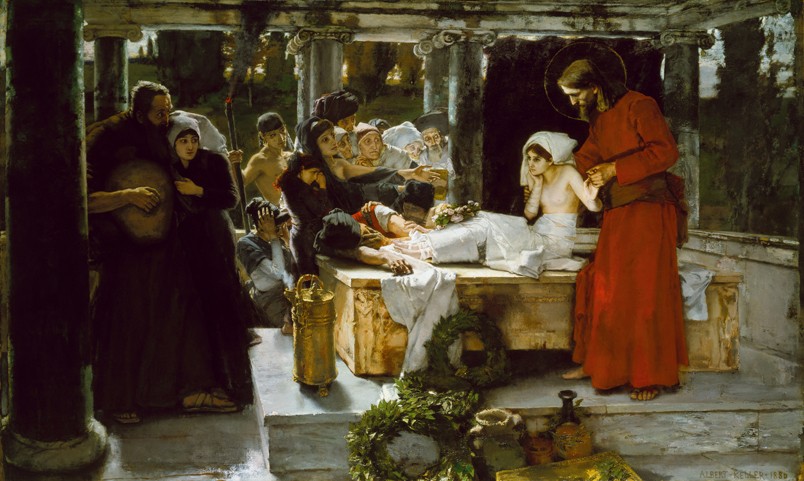
Reflection for the 13th Sunday in Ordinary Time (Cycle B)
We have always been taught through the Gospel that the Christ has complete dominion over sickness and death, and this reality is evident in the stories in today’s readings about the woman suffering from a twelve-year hemorrhage, and the heart-wrenching demise of Jairus’ daughter.
But we may also wonder if he had such power over anything that would trouble the mind or confuse the spirit, then why did he allow bodily sickness and death in the first place? Not a few may ask why Jesus in his eternal divine nature, was not around to prevent the eventual death of both women; and if he can raise people from the dead, why would he not just keep resurrecting every person who dies in historical time?
The reality that everyone gets sick and will eventually die anyway, is much too obvious that “miracle” tales must be pondered upon more deeply in determining what evangelists wish to convey about Christ’s purpose beyond a mere display of magical abilities.
The answer to these questions may simply lie in the fact that though he may have the power to do so, it was never the intent of our Lord to intervene in the proper course of nature.
Natural physical sickness has to occur to teach us how to care for our bodies and to avoid reckless excesses beyond its limits. Natural physical death has to happen because the cosmos operates such that generations must end at some point in time in order to regenerate the next i.e., the mature if existing in perpetuity, can no longer give way to the maturing. Natural calamities such as earthquakes, typhoons or tornadoes – events we have often associated with “evil” because of the extreme disruptions they can cause on our daily activities – are in fact, positive indications of a breathing planet capable of supporting life.
Expecting Jesus to compel creation to follow our will, to grant what we want, is a clear sign of our stubborn self-centeredness. Holding him accountable for unanswered prayers for healing and blessings, is downright blasphemy.
What our Lord lovingly promised to do for us, is to respond appropriately to our faithful trust in him as we commit ourselves totally and unconditionally to him in our service for the kingdom of God.
He promises to be our defender and protector from “unnatural” sickness and death, from the illnesses, misfortunes and tragedies emanating from the evil of humanity itself.
How many people have unnecessarily fallen because of injustice and oppression? How many will grow weak from hunger and thirst because of an indifference to the plague of destitution? How many will die because the needed care cannot materialize or arrive because of an obsessive preoccupation with efficiency or short-term gains? How many will just be forgotten because we have wasted so much time planning how we should be remembered?
Indeed, God never rejoiced in a meaningless “destruction of the living,” especially if the living are strongly inclined to destroying each other. The Apostle points us to the example of Christ’s “gracious act” which mirrors the justice that will prevent “unnatural” sickness and death, and the peace that will prevail over the kingdom – “whoever had much did not have more, and whoever had little did not have less.” Would the woman’s hemorrhage not have worsened if it were not for the corruption of her medical counselors?
The raising of the daughter of Jairus is both a command from our Lord to “arise” from the foolishness of our proud and selfish ways … and a fair warning: that the One who can conquer all sickness and death, temper the tempest and suspend nature for the sake of those who have surrendered themselves to the mission of the Spirit to achieve “heaven on earth,” will be the same One who will “scatter the proud in their conceit,” who will “cast down the mighty from their thrones,” who will “lift up the lowly,” who will “fill the hungry with good things” and who will “send away the rich empty.”
These are the miracles of justice, the realization of the Beatitudes, the fulfillment of the Gospel. Those who have become conscientiously responsible for alleviating and improving the human condition, will themselves be well-provided for, even when they have already joined him in the tranquil bliss of paradise. Those who fail to be responsible for the needs of another, leading to an untimely sickness or death, will be accountable to him on the day of final judgment.
Brother Jess Matias is a professed brother of the Secular Franciscan Order. He serves as minister of the St. Pio of Pietrelcina Fraternity at St. Francis of Assisi Parish in Mandaluyong City, coordinator of the Padre Pio Prayer Groups of the Capuchins in the Philippines and prison counselor and catechist for the Bureau of Jail Management and Penology.
The views expressed in this article are the opinions of the author and do not necessarily reflect the editorial stance of LiCAS.news.
Source: Licas Philippines
0 Comments